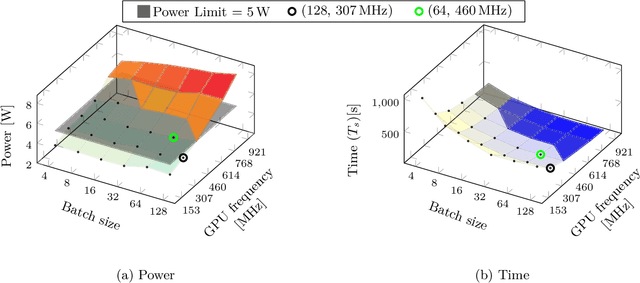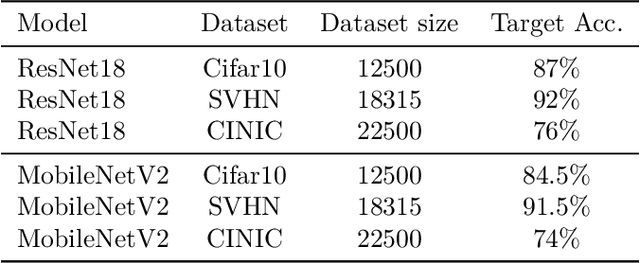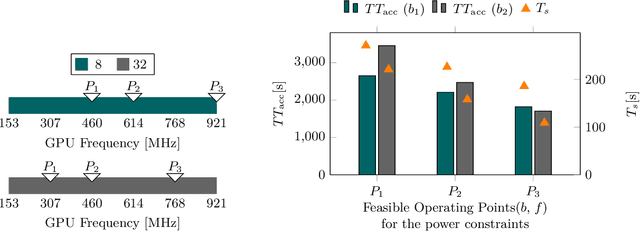Osama Abboud
Accelerated Training on Low-Power Edge Devices
Feb 25, 2025



Abstract:Training on edge devices poses several challenges as these devices are generally resource-constrained, especially in terms of power. State-of-the-art techniques at the device level reduce the GPU frequency to enforce power constraints, leading to a significant increase in training time. To accelerate training, we propose to jointly adjust the system and application parameters (in our case, the GPU frequency and the batch size of the training task) while adhering to the power constraints on devices. We introduce a novel cross-layer methodology that combines predictions of batch size efficiency and device profiling to achieve the desired optimization. Our evaluation on real hardware shows that our method outperforms the current baselines that depend on state of the art techniques, reducing the training time by $2.4\times$ with results very close to optimal. Our measurements also indicate a substantial reduction in the overall energy used for the training process. These gains are achieved without reduction in the performance of the trained model.
Apodotiko: Enabling Efficient Serverless Federated Learning in Heterogeneous Environments
Apr 22, 2024Abstract:Federated Learning (FL) is an emerging machine learning paradigm that enables the collaborative training of a shared global model across distributed clients while keeping the data decentralized. Recent works on designing systems for efficient FL have shown that utilizing serverless computing technologies, particularly Function-as-a-Service (FaaS) for FL, can enhance resource efficiency, reduce training costs, and alleviate the complex infrastructure management burden on data holders. However, current serverless FL systems still suffer from the presence of stragglers, i.e., slow clients that impede the collaborative training process. While strategies aimed at mitigating stragglers in these systems have been proposed, they overlook the diverse hardware resource configurations among FL clients. To this end, we present Apodotiko, a novel asynchronous training strategy designed for serverless FL. Our strategy incorporates a scoring mechanism that evaluates each client's hardware capacity and dataset size to intelligently prioritize and select clients for each training round, thereby minimizing the effects of stragglers on system performance. We comprehensively evaluate Apodotiko across diverse datasets, considering a mix of CPU and GPU clients, and compare its performance against five other FL training strategies. Results from our experiments demonstrate that Apodotiko outperforms other FL training strategies, achieving an average speedup of 2.75x and a maximum speedup of 7.03x. Furthermore, our strategy significantly reduces cold starts by a factor of four on average, demonstrating suitability in serverless environments.
Training Heterogeneous Client Models using Knowledge Distillation in Serverless Federated Learning
Feb 11, 2024Abstract:Federated Learning (FL) is an emerging machine learning paradigm that enables the collaborative training of a shared global model across distributed clients while keeping the data decentralized. Recent works on designing systems for efficient FL have shown that utilizing serverless computing technologies, particularly Function-as-a-Service (FaaS) for FL, can enhance resource efficiency, reduce training costs, and alleviate the complex infrastructure management burden on data holders. However, existing serverless FL systems implicitly assume a uniform global model architecture across all participating clients during training. This assumption fails to address fundamental challenges in practical FL due to the resource and statistical data heterogeneity among FL clients. To address these challenges and enable heterogeneous client models in serverless FL, we utilize Knowledge Distillation (KD) in this paper. Towards this, we propose novel optimized serverless workflows for two popular conventional federated KD techniques, i.e., FedMD and FedDF. We implement these workflows by introducing several extensions to an open-source serverless FL system called FedLess. Moreover, we comprehensively evaluate the two strategies on multiple datasets across varying levels of client data heterogeneity using heterogeneous client models with respect to accuracy, fine-grained training times, and costs. Results from our experiments demonstrate that serverless FedDF is more robust to extreme non-IID data distributions, is faster, and leads to lower costs than serverless FedMD. In addition, compared to the original implementation, our optimizations for particular steps in FedMD and FedDF lead to an average speedup of 3.5x and 1.76x across all datasets.
Towards Generalizability of Multi-Agent Reinforcement Learning in Graphs with Recurrent Message Passing
Feb 09, 2024



Abstract:Graph-based environments pose unique challenges to multi-agent reinforcement learning. In decentralized approaches, agents operate within a given graph and make decisions based on partial or outdated observations. The size of the observed neighborhood limits the generalizability to different graphs and affects the reactivity of agents, the quality of the selected actions, and the communication overhead. This work focuses on generalizability and resolves the trade-off in observed neighborhood size with a continuous information flow in the whole graph. We propose a recurrent message-passing model that iterates with the environment's steps and allows nodes to create a global representation of the graph by exchanging messages with their neighbors. Agents receive the resulting learned graph observations based on their location in the graph. Our approach can be used in a decentralized manner at runtime and in combination with a reinforcement learning algorithm of choice. We evaluate our method across 1000 diverse graphs in the context of routing in communication networks and find that it enables agents to generalize and adapt to changes in the graph.
FedLesScan: Mitigating Stragglers in Serverless Federated Learning
Nov 10, 2022Abstract:Federated Learning (FL) is a machine learning paradigm that enables the training of a shared global model across distributed clients while keeping the training data local. While most prior work on designing systems for FL has focused on using stateful always running components, recent work has shown that components in an FL system can greatly benefit from the usage of serverless computing and Function-as-a-Service technologies. To this end, distributed training of models with severless FL systems can be more resource-efficient and cheaper than conventional FL systems. However, serverless FL systems still suffer from the presence of stragglers, i.e., slow clients due to their resource and statistical heterogeneity. While several strategies have been proposed for mitigating stragglers in FL, most methodologies do not account for the particular characteristics of serverless environments, i.e., cold-starts, performance variations, and the ephemeral stateless nature of the function instances. Towards this, we propose FedLesScan, a novel clustering-based semi-asynchronous training strategy, specifically tailored for serverless FL. FedLesScan dynamically adapts to the behaviour of clients and minimizes the effect of stragglers on the overall system. We implement our strategy by extending an open-source serverless FL system called FedLess. Moreover, we comprehensively evaluate our strategy using the 2nd generation Google Cloud Functions with four datasets and varying percentages of stragglers. Results from our experiments show that compared to other approaches FedLesScan reduces training time and cost by an average of 8% and 20% respectively while utilizing clients better with an average increase in the effective update ratio of 17.75%.
 Add to Chrome
Add to Chrome Add to Firefox
Add to Firefox Add to Edge
Add to Edge